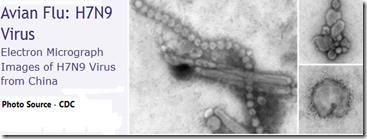
# 8057
The `big’ infectious disease story in the Chinese press this morning is a statement by Yao Hongwen, spokesman for the National Health and Family Planning Commission in Beijing, that reassures that `no mutations’ have been observed in the H7N9 virus, and that humans have only acquired the virus from contact with animals.
While it is true that conclusive proof of human-to-human transmission of this virus is lacking, there are a small number of family clusters where H2H is strongly suspected (See BMJ: `Probable Person-to-Person Transmission’ Of H7N9 and last April’s WHO: Transcript Of Media Briefing On H7N9).
But the lack of secondary infections among the hundreds of contacts of known cases certainly suggests that ongoing H2H transmission is probably a rare event. That said, the number and potential impact of mild or asymptomatic infections with this virus remains unknown, and a bit of a `wild card’.
The spokesman’s broad assurances that `no mutations’ have been detected is probably more reasonably interpreted as `no genetic changes likely to affect the fitness or performance of this virus’ , as some minor (and usually inconsequential) genetic variations between isolates are to be expected.
While today’s statement is primarily designed to be reassuring, noticeably absent from any of the half dozen Chinese language reports I’ve scanned this morning on this story are the sorts of public health safety messaging that Hong Kong’s CHP has been busily promoting for months.
No warnings about live avoiding live bird markets, thorough cooking of poultry or eggs, washing hands, avoiding crowded places and contact with fever patients, and the wearing masks if sick, etc.
A curious omission, considering this comes from the NHFPC, which – among other things – is tasked with raising health awareness and education.
No H7N9 mutation: health authority
English.news.cn 2013-12-10 16:40:40
BEIJING, Dec. 10 (Xinhua) -- No mutation of H7N9 bird flu has been monitored yet and transmission from animals remains the only way in which humans have picked up the virus, China's health authority said on Tuesday.
Speaking at a press conference, Yao Hongwen, spokesman for the National Health and Family Planning Commission, noted that there have continued to be sporadic reports of H7N9 infections.
China confirmed three new cases this month, with two in Hong Kong and one in east China's Zhejiang Province, and Yao said that local authorities have tightened prevention measures.
The spokesman promised that the commission will continue to strictly control infection sources and release relevant information on a timely basis.
The mainland has so far reported a total of 140 H7N9 cases, including 87 patients who have recovered.